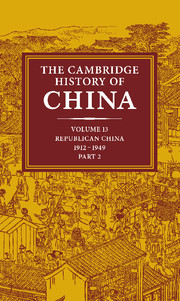Book contents
- Frontmatter
- 1 Introduction: perspectives on modern China's History
- 2 China's international relations 1911–1931
- 3 Nationalist China during the Nanking decade 1927–1937
- 4 The Communist movement 1927–1937
- 5 The agrarian system
- 6 Peasant movements
- 7 The development of local government
- 8 The growth of the academic community 1912–1949
- 9 Literary trends: the road to revolution 1927–1949
- 10 Japanese aggression and China's international position 1931–1949
- 11 Nationalist China during the Sino-Japanese War 1937–1945
- 12 The Chinese Communist movement during the Sino-Japanese War 1937–1945
- 13 The KMT-CCP conflict 1945–1949
- 14 Mao Tse-Tung's thought to 1949
- Bibliographical Essays
- Bibliography
- Conversion table: pinyin to Wade-Giles
- Index
- Republican China - physical features">
- References
10 - Japanese aggression and China's international position 1931–1949
Published online by Cambridge University Press: 28 March 2008
- Frontmatter
- 1 Introduction: perspectives on modern China's History
- 2 China's international relations 1911–1931
- 3 Nationalist China during the Nanking decade 1927–1937
- 4 The Communist movement 1927–1937
- 5 The agrarian system
- 6 Peasant movements
- 7 The development of local government
- 8 The growth of the academic community 1912–1949
- 9 Literary trends: the road to revolution 1927–1949
- 10 Japanese aggression and China's international position 1931–1949
- 11 Nationalist China during the Sino-Japanese War 1937–1945
- 12 The Chinese Communist movement during the Sino-Japanese War 1937–1945
- 13 The KMT-CCP conflict 1945–1949
- 14 Mao Tse-Tung's thought to 1949
- Bibliographical Essays
- Bibliography
- Conversion table: pinyin to Wade-Giles
- Index
- Republican China - physical features">
- References
Summary
Starting in the 1930s as a lone victim of aggression, enjoying little systematic help from the world community, China ended the Second World War as a member of a victorious global coalition, endowed with the status of a major power, only to see its position undermined because of a civil war. To trace this development in some detail is to understand the close links between domestic and international affairs, between China as it was and as it might have been.
THE WORLD ECONOMIC CRISIS: CHINA'S MARGINALITY
Any discussion of China's international affairs during the 1930s must start from the world economic crisis which began in 1929. This crisis primarily affected the advanced industrial countries which had, after the World War, sought desperately to re-establish a prewar-type international order for trade, investment and other forms of economic transactions. The landmarks of the 1920s – the return to the gold standard at prewar parity in the United States, Britain and elsewhere; the containment of dangerous inflational spirals in Germany, France and Italy; compromise settlements of the debt and reparations question – had hardly concerned China. Its trade never amounted to more than a fraction of the total volume of international trade, and foreign investments in China were not significant beside those in Japan or in European countries. The United States, the major sustainer of the international economic system after the war, did not expand its trade or investment in China. American goods and capital found other, more attractive outlets, especially in Germany and Japan.
Keywords
- Type
- Chapter
- Information
- The Cambridge History of China , pp. 492 - 546Publisher: Cambridge University PressPrint publication year: 1986
References
- 2
- Cited by



